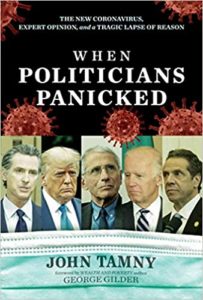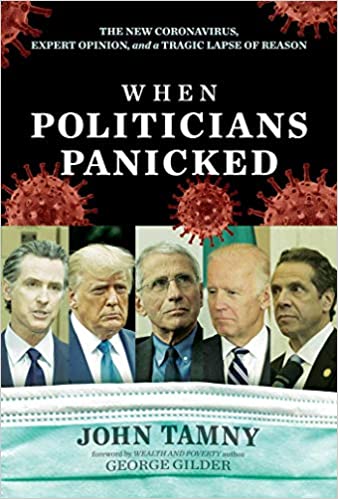
“John Tamny bravely describes the terrible and senseless economic pain caused by politicians panicking in the face of a health concern that—let’s be real—is no worse than a bad flu season.” So writes Forbes publisher Rich Karlgaard in his blurb for John Tamny’s latest book, When Politicians Panicked. Let’s see: The worst flu season in the last 100 years was in 1957–1958, when the Asian flu (technically H2N2) killed between 70,000 and 116,000 Americans. If a flu today killed the same percentage of the U.S. population, the U.S. death toll would be between 135,000 and 223,000. Given that the official U.S. death toll from COVID-19 is nearing 600,000 as this goes to print, and given that 600,000 is almost three times the upper limit of the worst flu in a century, it’s Karlgaard who should “be real.”
After reading that blurb, I didn’t expect to find Tamny’s book impressive. Fortunately, I did. The highest compliment I can give it is that it’s Hayekian. Friedrich Hayek, in his 1945 article “The Use of Knowledge in Society,” argued that central planners could not successfully plan an economy because they didn’t have the necessary knowledge of people’s individual circumstances. Although I read every page and every footnote of When Politicians Panicked, I didn’t see Tamny ever referencing Hayek. (The book doesn’t have an index.) But his book is thoroughly Hayekian. He argues that government officials didn’t know enough, and couldn’t know enough, to shut down whole sectors of the economy. He also argues quite persuasively that government policies like the Paycheck Protection Program badly misallocated both labor and capital, making us poorer than otherwise.
This is from David R. Henderson, “Overreacting to COVID,” Regulation, Summer 2021.
Another excerpt:
And then there was the federal government’s more than $600 billion Payroll Protection Plan, which paid small businesses substantial amounts to keep their employees on the payroll even if the employees were being underemployed. Was that a good idea? Absolutely not, says Tamny. He points out what should have been obvious to all but apparently wasn’t: government officials had no way of knowing which jobs should be kept and which ones shouldn’t. Precisely because some customers might want less human interaction because of their fear of the virus, “it was possible that businesses would devise all manner of ways to save on labor while meeting new or evolving needs of customers that they didn’t express before the spread of the coronavirus.” He notes that some factories and warehouses were rushing to “automate away some aspects of human exertion simply because employees of companies like Amazon were demanding the evolution.”
But isn’t it important that government save jobs? Every economist knows, or should know, the problem with that view, but Tamny has a particularly refreshing way of making the point. In a chapter titled “They Would Stop You at ‘Job Creation,’” Tamny writes that the fact that the Paycheck Protection Plan “was all about job preservation was the surest sign of how pointless and wasteful it was.” No one, he writes, starts a business with the goal of creating jobs. You create a business to make money and you make money by creating goods and services that people value. Indeed, often you do well by introducing technologies that allow you to produce more with fewer workers. That’s the story of agriculture, steel making, auto production, and pretty much everything else. Tamny writes, “If readers are looking for 100 percent labor force participation, just travel to the world’s poorest countries.” There you will see very little unemployment and a lot of people working in “unrelenting drudgery.”
I also point out a major failing in an otherwise very good book: his mistaken caricature of economists.
Read the whole thing.


READER COMMENTS
Thomas Lee Hutcheson
Jun 26 2021 at 7:57pm
The PPP was a perfect example of a mistake ready to happen. Unemployment insurance should have provided a known in advance proportion of lost income + heath insurance with standards of proof set for aggregate severity so there would have been no need for Congress to invent the Rube Goldberg PPP in the fly. Rules not discretion!
Of course the real culprit was the Fed for not having a credible commitment to maintaining NGDP (even keeping the price level on track would have helped ). It allowed markets to believe (and then validated the belief) that it would dither and wait and see what to do until expectations of a recession were in place.
Politicians indeed made very bad decisions, but the CDC did not provide data for economists to design optimal policies wrt testing and restricting social and commercial activities, either.
john hare
Jun 27 2021 at 5:17am
There will be some level of motivated reasoning in my comment.
When PPP came out my partner (I’m 49% owner) said we were signing up for it and I agreed as we didn’t know what was going to happen. While modest for a 4 man company, it was still a nice cushion when the lockdowns were screwing up operations. We worked at the shop a lot doing useful things that normally wouldn’t have gotten done at the time. Took several jobs at low prices losing a bit of money while stretching out the margins. And had a policy that if you don’t feel well stay home with pay, which all of us did at least once. We had an attitude that If we had not signed up while the competition did, we would have been at a competitive disadvantage.
While my company did benefit by it, with hindsight we would have weathered the storm. Many of the problems were caused by the panic rather than rational decisions. My people have been loyal through the recession and we have been loyal to them. It was the uncertainty about the disease and the knee jerk political reactions that were scary.
Motivated reasoning aside, I think the country would have been better off if my company and others had been left to sink or swim but with a lot less government interference with the economy. Going through tough times weeds out a few. But many got weeded out anyway if they needed and were not eligible for PPP, or if they were but still went under.
robc
Jun 28 2021 at 9:09pm
Off-topic, but something David Henderson has mentioned recently:
I am at my Mother’s house and we are helping her clear out her house of old and unwanted stuff.
We put her 1980 tv and console cabinet out by the garbage for pickup tomorrow. Then my wife and I went for a 2 mile walk. It was gone when we got back. It weighs approximately 900 billion tons*, so good for them.
I am not sure exactly what it says about my Mom’s neighborhood.
*Possible slight exaggeration.
Comments are closed.